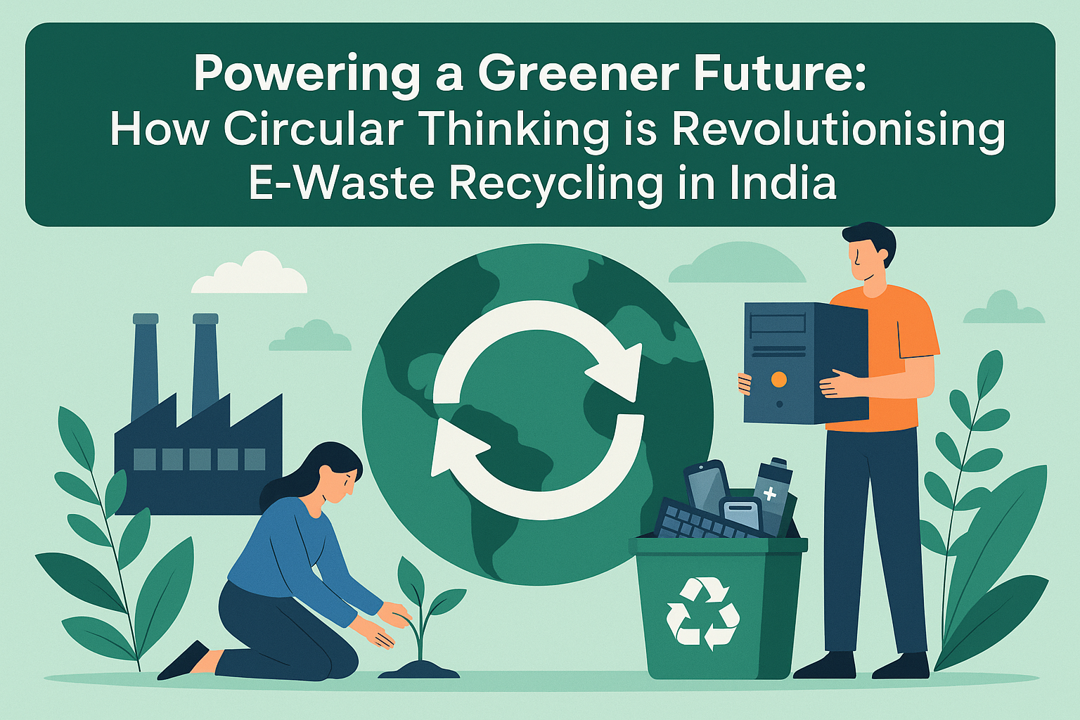The digital age has transformed how we live and work—but it has also created a silent crisis: the rapid buildup of electronic waste. From discarded smartphones to obsolete laptops, India is witnessing a surge in e-waste like never before. While traditional dumping methods choke our landfills and leak toxins into the environment, a new path is emerging—one that views waste not as garbage, but as a resource.
At Epicircle, we believe the future lies in a circular economy model—where every piece of electronic waste is repurposed, reused, or responsibly recycled.
Rethinking E-Waste: The Circular Economy Mindset
A circular economy moves beyond the outdated “use-and-throw” model. Instead, it embraces a smarter approach: designing products to last longer, extracting maximum value from used electronics, and reintegrating recovered materials back into production. It’s about closing the loop—where waste becomes the start of something new.
Unlike the linear economy, which depletes natural resources and pollutes ecosystems, circular thinking in e-waste helps:
- Cut down raw material extraction
- Reduce greenhouse gas emissions
- Minimise toxic pollution
- Extend the life of products and materials
By tapping into this cycle, Epicircle helps individuals and businesses turn their junk electronics into valuable resources—while protecting the planet.
5 Groundbreaking Innovations Driving E-Waste Recycling Today
The e-waste revolution is being powered by a wave of cutting-edge solutions. Here are five technologies transforming how India manages its digital discards:
- Smart Material Recovery Systems
Sophisticated machines can now extract precious metals like gold, palladium, and copper with high precision—directly from discarded circuit boards. - Automated Dismantling Stations
Robotics and AI help disassemble electronics quickly and safely, reducing manual labor risks and improving efficiency. - Clean Battery Recycling Tech
Innovative chemical processes reclaim lithium, cobalt, and nickel from spent batteries, supporting the electric vehicle and renewable energy sectors. - Blockchain for Waste Tracking
Transparent digital ledgers ensure traceability in the e-waste chain, building trust and improving compliance with environmental standards. - Consumer-Friendly Collection Platforms
Apps like Epicircle are simplifying how people dispose of e-waste—by offering doorstep pickups, digital tracking, and even rewards in return.
How Epicircle is Leading the Change
We’re not just another scrap collection company—we’re building a system where every device dropped off becomes part of a larger sustainability loop. Through our platform, users can:
- Book pickups for old electronics in a few clicks
- Earn gold-based rewards for their e-waste contributions
- Track recycling progress through a transparent, tech-enabled process
Our partnerships with certified recyclers ensure every item we collect is dismantled, processed, and repurposed responsibly. We also help businesses comply with EPR (Extended Producer Responsibility) mandates through structured collection and reporting.
The Real-World Impact of the Circular Model
Switching to a circular economy in e-waste management isn’t just a buzzword—it’s a game-changer. Here’s why it matters:
- Saves Natural Resources: Recovering metals from e-waste means fewer mines, less water use, and less deforestation.
- Reduces Toxic Pollution: Proper recycling prevents dangerous substances from seeping into soil and water.
- Creates Green Jobs: From collectors to processors, a thriving circular economy supports livelihoods.
- Supports Smart Cities: Cleaner urban spaces and efficient waste systems go hand-in-hand.
- Meets Global Goals: Circular practices help nations achieve sustainability and climate targets.
Challenges on the Path — and What Needs to Happen
Despite the momentum, the road to a circular e-waste economy isn’t without hurdles:
Current Challenges:
- Low public awareness about proper e-waste disposal
- Dominance of informal, unregulated recyclers
- Insufficient pickup and collection infrastructure
- Limited investment in recycling technology
- Rapid e-waste growth outpacing solutions
What Must Happen:
- Mass education campaigns to drive behavioral change
- Integration of informal workers into formal systems with training and support
- Expansion of tech-enabled collection networks like Epicircle
- Government grants and policies that incentivize circular investments
- Research and development in material recovery and clean processing
Join the Movement
The shift to circular e-waste management isn’t just an environmental decision—it’s an economic and social one. At Epicircle, we’re empowering individuals and communities to rethink waste and embrace a future where sustainability meets smart innovation.
Whether you’re a household with old gadgets or a business needing to meet compliance, we make it easy to do the right thing.
FAQs
What is Epicircle’s role in e-waste recycling?
We offer a tech-powered platform for scheduling e-waste pickups, ensuring your electronic scrap is collected and recycled responsibly. In return, you earn digital gold rewards.
Can I recycle any type of electronic waste through Epicircle?
Yes! We accept a wide range of items—from smartphones and laptops to cables and batteries. Just schedule a pickup via our app.
How does recycling help the environment?
Recycling recovers valuable materials, prevents toxic waste from polluting ecosystems, and reduces the need for new resource extraction.
What is Extended Producer Responsibility (EPR)?
EPR is a policy that requires manufacturers to manage the end-of-life disposal of their products. Epicircle supports EPR compliance for businesses by collecting and channeling waste to authorized recyclers.
Why should individuals care about circular e-waste management?
Because every small action—like responsibly discarding an old charger—helps reduce pollution, conserve resources, and build a better tomorrow.



Leave A Comment